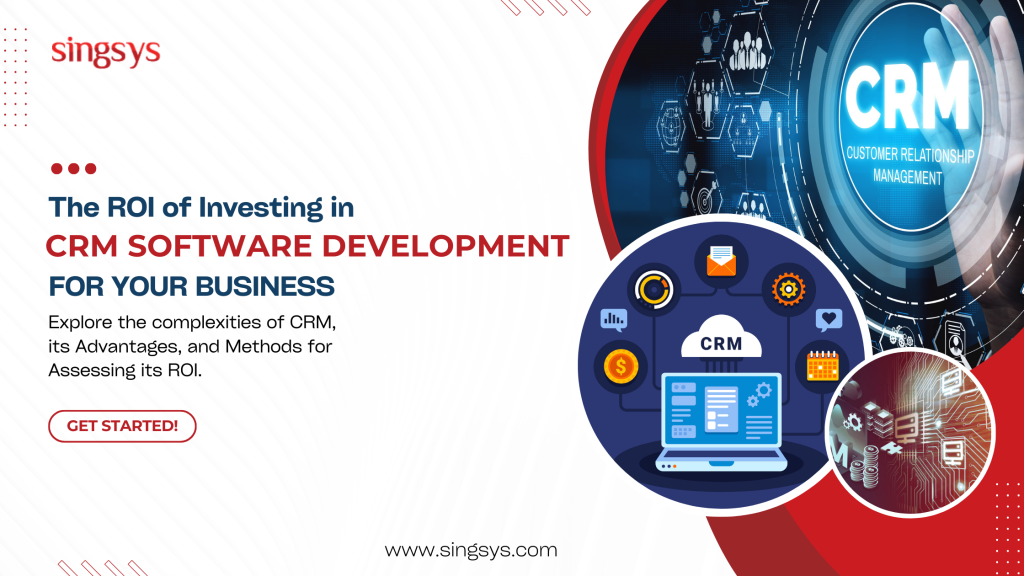Shift-Left vs Shift-Right Testing: What Actually Works in Production
Software quality is not something that testers have to think about at the end of development anymore. It is something that everyone has to think about all the time when […]

Customer Relationship Management (CRM) software has become essential for companies aiming to stay ahead in today’s competitive market. By optimising processes, improving customer interactions, and boosting sales, CRM systems have transformed the business landscape.
Evaluating the return on investment (ROI) of CRM software development is critical for decision-makers looking to justify this substantial investment.
In this post, we will explore the complexities of CRM, its advantages, and methods for assessing its ROI.
A Customer Relationship Management (CRM) software is a powerful centralised tool that consolidates and streamlines all customer interactions and data. It serves as a comprehensive repository for customer information, encompassing everything from contact details and purchase history to previous support tickets and marketing engagements.
This invaluable data resource equips teams across various departments with the insights and information they need to better understand and serve customers.
Sales: Target leads more effectively with personalised outreach based on custom data fields you define. For example, an e-commerce store might create custom fields for product preferences, past purchase history, and abandoned cart details. This allows sales reps to tailor their outreach with relevant product recommendations and special offers, significantly improving conversion rates.
Marketing: Create customised marketing initiatives that appeal to particular groups of customers. Divide your customer base based on demographics, buying patterns, and hobbies. This will enable you to dispatch highly pertinent marketing emails, social media initiatives, and personalised promotions, resulting in increased involvement and sales.
Support: Deliver exceptional customer service with a complete view of past interactions. Imagine a support agent who can instantly access a customer’s past purchases, support tickets, and communication history. This enables them to resolve issues faster, provide more personalised support, and foster stronger customer loyalty.
Return on Investment (ROI) is a Key metric for evaluating the profitability of an investment. In the context of CRM software, ROI measures the financial gains from CRM implementation against its costs.
Initial Costs vs. Long-term Savings:
Metrics to Consider:
Also read: How can Custom Software Development help your Business Grow
Return on Investment (ROI) is the ultimate metric for evaluating business decisions. Here’s how a custom CRM delivers a superior ROI compared to generic solutions:
Example 1: A retail company used Salesforce CRM to make it easier to interact with customers and manage sales. After a year, they found that sales had gone up by 20% and fewer customers were leaving (churn decreased by 15%). They also saw that using automated marketing campaigns made it easier to turn potential customers into actual customers – a 30% increase in lead conversions. They calculated that in the first two years, they got 150% back on their investment.
Example 2: HubSpot CRM for a Marketing Agency A marketing agency adopted HubSpot CRM to manage its growing client base and automate marketing efforts. The result was a 25% boost in productivity due to automated workflows, and a 40% increase in client retention rates. The agency saw a 200% ROI within 18 months of implementation.
While the benefits of CRM software are substantial, businesses must navigate certain challenges:
Potential Obstacles:
Cost Considerations and Budget Planning:
Tips for Selecting the Right CRM Software:
The CRM landscape is continuously evolving, with emerging technologies poised to transform its capabilities:
AI and Machine Learning:
Integration with IoT:
Enhanced Mobile CRM:
Increased Focus on Customer Experience:
Investing in CRM software development is not just about implementing a new tool—it’s about investing in the future success of your business. By leveraging custom CRM solutions, businesses can improve customer relationships, streamline processes, and drive growth.
The ROI of investing in CRM software development is clear, with tangible benefits such as increased revenue, reduced costs, and improved efficiency. As businesses continue to evolve and adapt to changing market dynamics, CRM software will remain a critical tool for driving long-term business growth.
Singsys crafts custom CRM software solutions that transform your business.
Are you ready to unlock the full potential of your customer relationships? Singsys, a leading custom CRM software development company based in Singapore and India with over 15 years of experience, crafts solutions to transform your business. Their team boasts expertise in CRM development, having successfully delivered numerous projects, including their own in-house CRM system. This deep understanding of CRM functionality ensures they can deliver solutions that perfectly match your needs.
Contact us today and discover how a custom CRM can unlock the full potential of your customer relationships.

CRM software, or Customer Relationship Management software, is a tool used by businesses to manage interactions with customers and prospects. It helps streamline processes, improve customer satisfaction, and drive sales growth.
CRM is important for businesses because it helps them build and maintain strong relationships with customers, leading to increased loyalty, retention, and ultimately, higher profitability.
The main types of CRM software are Operational CRM, Analytical CRM, and Collaborative CRM. Operational CRM focuses on automating customer-facing processes, Analytical CRM analyses customer data for insights, and Collaborative CRM fosters collaboration across departments.
ROI for CRM software is calculated by comparing the net profit generated from the CRM investment to the cost of implementing and maintaining the software. This calculation considers factors such as customer retention, sales growth, and efficiency gains.
Custom CRM software development offers benefits such as tailored solutions to fit specific business needs, flexibility for future growth, and seamless integration with existing processes. It ensures that the CRM software aligns perfectly with the unique requirements of the business.
Feb 10th, 2026
Software quality is not something that testers have to think about at the end of development anymore. It is something that everyone has to think about all the time when […]
Feb 5th, 2026
The oil and gas industry is one of the most data-heavy industries in the world. Every day, companies generate massive amounts of data from drilling operations, seismic surveys, production systems, […]
Jan 27th, 2026
Choosing the right software is no longer just an IT decision — it is a business decision. Whether you are a startup trying to move fast or an enterprise looking […]